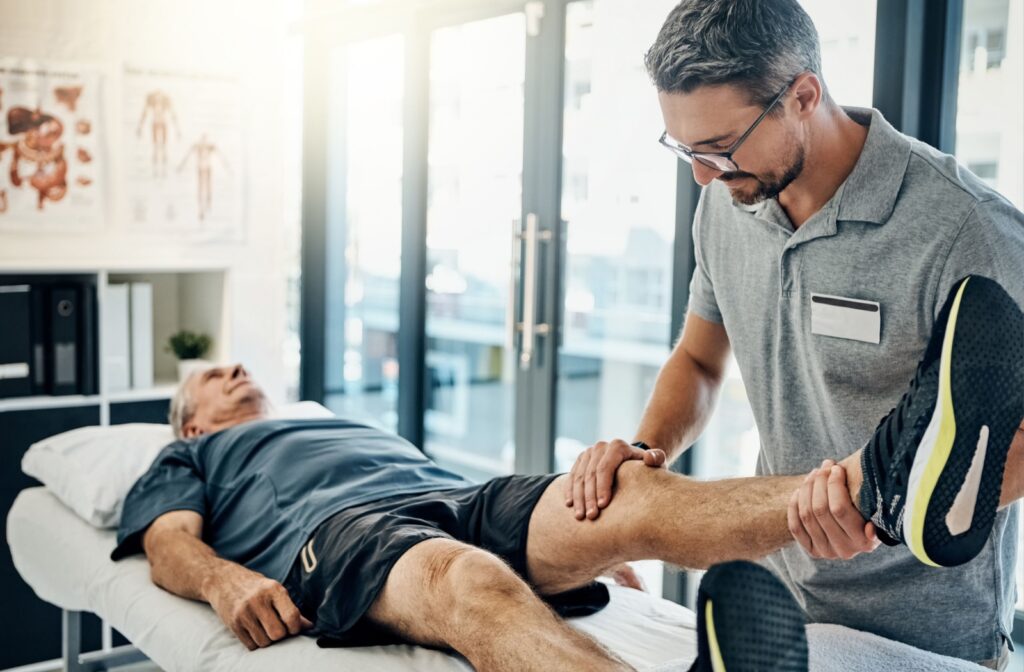The knees are the foundation of movement for many daily activities, and any injury to these vital joints can be both painful and limiting. For seniors, a meniscus tear can influence their ability to stay active, comfortable, and independent.
Our bodies change naturally as we age, though the desire to stay active may not. With these changes comes an increased risk of certain injuries—and an even greater importance on proper recovery. This can mean needing more assistance to complete daily tasks, but it’s all in the name of maintaining a happy, healthy lifestyle.
What Is a Meniscus Tear?
The meniscus is a C-shaped piece of cartilage in each knee that serves as a cushion between the thigh bone (femur) and the shin bone (tibia). Its job is to absorb shock and keep the knee stable. Each knee has two menisci, one on the inner and one on the outer side.
Over time, this cartilage naturally changes. With age and years of use, the meniscus becomes thinner, more fragile, and prone to injury. For older adults, even simple, everyday movements can cause a tear. Tripping on a curb, rising awkwardly from a chair, or twisting the knee can all lead to discomfort and pain.
Common reasons for meniscus tears in seniors include:
- Thinning: Aging and constant use wear down the meniscus, leading to weak spots that are more prone to tearing.
- Accidents: Slips, trips, and falls place significant stress on the knee joint, often causing tears.
- Jerking or twisting movements: Rotating the knee while standing or turning can strain the meniscus and result in injury.
The need for healthy knees touches almost every part of our daily routine. This means that a meniscus tear doesn’t just cause pain and discomfort; it also disrupts basic tasks like walking, climbing stairs, or getting up from a chair.
How Meniscus Tears Affect Daily Life
When the meniscus tears, it can no longer cushion and stabilize the knee joint effectively. This adds stress to the surrounding cartilage and bones, increasing the risk of developing conditions like osteoarthritis.
A torn meniscus often leads to:
- Pain: Especially during activities like walking, twisting, or bending the knee.
- Swelling and stiffness: The knee may feel tight or inflamed, making movement harder.
- Instability: Many older adults report feeling like their knee may “give out” while walking.
- Limited mobility: Difficulty bending or straightening the knee can make everyday activities more challenging.
- Risk of falls: An unstable or painful knee increases the likelihood of falls, which can lead to further injury.
Recognizing the symptoms of a meniscus tear as early as possible is crucial for addressing the issue before it worsens. Symptoms like swelling, knee pain during movement, or a popping sensation are common early indicators. Seeking help at the first sign can make all the difference.

Treatment Options for Meniscus Tears
It’s important to treat a meniscus tear promptly. Delaying care may result in longer recovery times, increased instability, and a greater reliance on support for mobility. Since a torn meniscus can make a person more prone to falls, delayed care can create a loop of worsening injuries. Depending on the severity of the tear and a person’s overall health, various treatment options are available.
Standard treatments include:
- RICE method: Rest, ice, compression, and elevation (RICE) can reduce pain and swelling for minor tears.
- Assistive devices: Knee braces or mobility aids like canes can provide support and alleviate stress on the joint while walking.
- Physical therapy: A physical therapist will recommend exercises designed to strengthen the muscles around the knee and improve stability and function.
- Surgical interventions: For more severe tears, surgery might be necessary to repair or remove the damaged portion of the meniscus.
The road to recovery can seem challenging, but rest assured that with the right care and support, seniors can manage the impact of a meniscus tear and return to the activities they enjoy.
Recovering in Respite Care
Recovery is a crucial phase after any knee injury, and having access to the proper support can make all the difference. Respite care services can provide short-term assistance to older adults who are healing from surgery or injury, offering both relief to families and dedicated care to boost recovery.
Many senior living communities offer these sorts of short-term stays designed with recovery and comfort in mind. Here are just a few ways it helps:
- Furnished suites with 24-hour staffing
- Assistance with daily activities and medication management
- Access to community amenities like a movie theater, walking trails, and a library
- Nutritious meals prepared on-site
- Opportunities for social engagement and emotional support
Respite care offers a welcoming space to focus on healing while staying supported by compassionate care and friendly connections.
Take the First Step Toward Supported Recovery
There’s no reason to face the challenges of recovering from a meniscus tear alone. With the encouragement of a supportive community, the path to recovery becomes smoother and more enjoyable.
We invite you to visit and see everything Parsons House Cypress has to offer firsthand. Book a tour today and discover how our community works for you!


